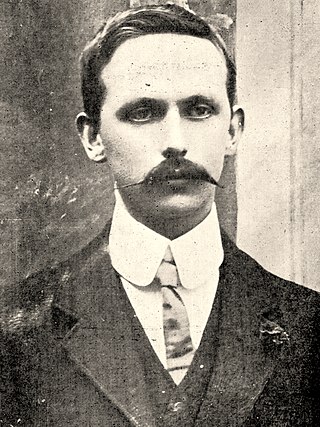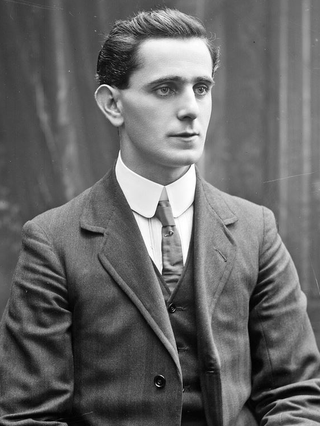
The Easter Rising, also known as the Easter Rebellion, was an armed insurrection in Ireland during Easter Week in April 1916. The Rising was launched by Irish republicans against British rule in Ireland with the aim of establishing an independent Irish Republic while the United Kingdom was fighting the First World War. It was the most significant uprising in Ireland since the rebellion of 1798 and the first armed conflict of the Irish revolutionary period. Sixteen of the Rising's leaders were executed starting in May 1916. The nature of the executions, and subsequent political developments, ultimately contributed to an increase in popular support for Irish independence.

Kilmainham Gaol is a former prison in Kilmainham, Dublin. It is now a museum run by the Office of Public Works, an agency of the Government of Ireland. Many Irish revolutionaries, including the leaders of the 1916 Easter Rising, were imprisoned and executed in the prison by the orders of the UK Government.

Joseph Mary Plunkett was an Irish republican, poet and journalist. As a leader of the 1916 Easter Rising, he was one of the seven signatories to the Proclamation of the Irish Republic. Plunkett married Grace Gifford in 1916, seven hours before his execution.

The Irish Volunteers, also known as the Irish Volunteer Force or the Irish Volunteer Army, was a paramilitary organisation established in 1913 by nationalists and republicans in Ireland. It was ostensibly formed in response to the formation of its Irish unionist/loyalist counterpart the Ulster Volunteers in 1912, and its declared primary aim was "to secure and maintain the rights and liberties common to the whole people of Ireland". Its ranks included members of the Conradh na Gaeilge, Ancient Order of Hibernians, Sinn Féin and the Irish Republican Brotherhood. Increasing rapidly to a strength of nearly 200,000 by mid-1914, it split in September of that year over John Redmond's support for the British war effort during World War I, with the smaller group opposed to Redmond's decision retaining the name "Irish Volunteers".

The Proclamation of the Republic, also known as the 1916 Proclamation or the Easter Proclamation, was a document issued by the Irish Volunteers and the Irish Citizen Army during the Easter Rising in Ireland, which began on 24 April 1916. In it, the Military Council of the Irish Republican Brotherhood, writing as the "Provisional Government of the Irish Republic," proclaimed Ireland's independence from the United Kingdom. The reading of the proclamation by Patrick Pearse outside the General Post Office (GPO) on Sackville Street, Dublin's main thoroughfare, marked the beginning of the Rising. The proclamation was modelled on a similar independence proclamation issued during the 1803 rebellion by Robert Emmet.

Thomas James Clarke was an Irish republican and a leader of the Irish Republican Brotherhood. Clarke was arguably the person most responsible for the 1916 Easter Rising. A proponent of armed struggle against British rule in Ireland for most of his life, Clarke spent 15 years in English prisons prior to his role in the Easter Rising and was executed by firing squad after it was defeated.

Éamonn Ceannt, born Edward Thomas Kent, was an Irish republican, mostly known for his role in the Easter Rising of 1916.

Seán Mac Diarmada, also known as Seán MacDermott, was an Irish republican political activist and revolutionary leader. He was one of the seven leaders of the Easter Rising of 1916, which he helped to organise as a member of the Military Committee of the Irish Republican Brotherhood (IRB) and was the second signatory of the Proclamation of the Irish Republic. He was executed for his part in the Rising at age 33.

Thomas Stanislaus MacDonagh was an Irish political activist, poet, playwright, educationalist and revolutionary leader. He was one of the seven leaders of the Easter Rising of 1916, a signatory of the Proclamation of the Irish Republic and Commandant of the 2nd Battalion, Dublin Brigade of the Irish Volunteers, which fought in Jacob's biscuit factory. He was executed for his part in the Rising at the age of thirty-eight.

George Noble Plunkett was an Irish nationalist politician, museum director and biographer, who served as Minister for Fine Arts from 1921 to 1922, Minister for Foreign Affairs from 1919 to 1921 and Ceann Comhairle of Dáil Éireann in January 1919. He served as a Teachta Dála (TD) from 1918 to 1927. He was a Member of Parliament (MP) for Roscommon North from 1917 to 1922.
The Irish Literary Revival was a flowering of Irish literary talent in the late 19th and early 20th century. It includes works of poetry, music, art, and literature.
Events from the year 1917 in Ireland.
Events from the year 1916 in Ireland.

Easter, 1916 is a poem by W. B. Yeats describing the poet's torn emotions regarding the events of the Easter Rising staged in Ireland against British rule on Easter Monday, April 24, 1916. The rebellion was unsuccessful, and most of the Irish republican leaders involved were executed. The poem was written between May and September 1916, printed privately, 25 copies, and appeared in magazines in 1920 but first published in 1920 in the collection Michael Robartes and the Dancer.

Grace Evelyn Gifford Plunkett was an Irish artist and cartoonist who was active in the Republican movement, who married her fiancé Joseph Plunkett in Kilmainham Gaol only a few hours before he was executed for his part in the 1916 Easter Rising.

George Oliver Plunkett, known to his contemporaries as Seoirse Plunkett, was a militant Irish republican. He was sentenced to death with his elder brother Joseph Plunkett and his younger brother John after the 1916 Easter Rising, but while Joseph was executed, George's and John's sentences were commuted. He was released in 1917, fought in the Irish War of Independence and Irish Civil War, and was briefly IRA Chief of Staff during World War II.
Gerry Hunt was an Irish cartoonist. He worked as an architect for 25 years, including 18 years at IDA Ireland. In 1986 he turned to cartooning, first drawing political cartoons, then creating a Spanish-language comic which he gave away to friends. In 2003 he created a short series of inner-city Dublin fables told in rhyme, In Dublin City, published by Atomic Diner. He then founded Dublin Comics, which published his crime graphic novel, Streets of Dublin, coloured by BrenB, c. 2005, and a collected edition of In Dublin City, also coloured by BrenB, c. 2007.

Fiona Plunkett was an Irish republican involved in the organisation of the Easter 1916 Rising and a leading member of Cumann na mBan.

Kimmage, is a suburb on the south side of the city of Dublin, Ireland.

Geraldine "Gerry" Plunkett Dillon (1891–1986) was an Irish republican and member of Cumann na mBan, best known for her memoir All in the blood. She was the sister of Joseph Mary Plunkett, a signatory of the 1916 Proclamation of the Irish Republic.















